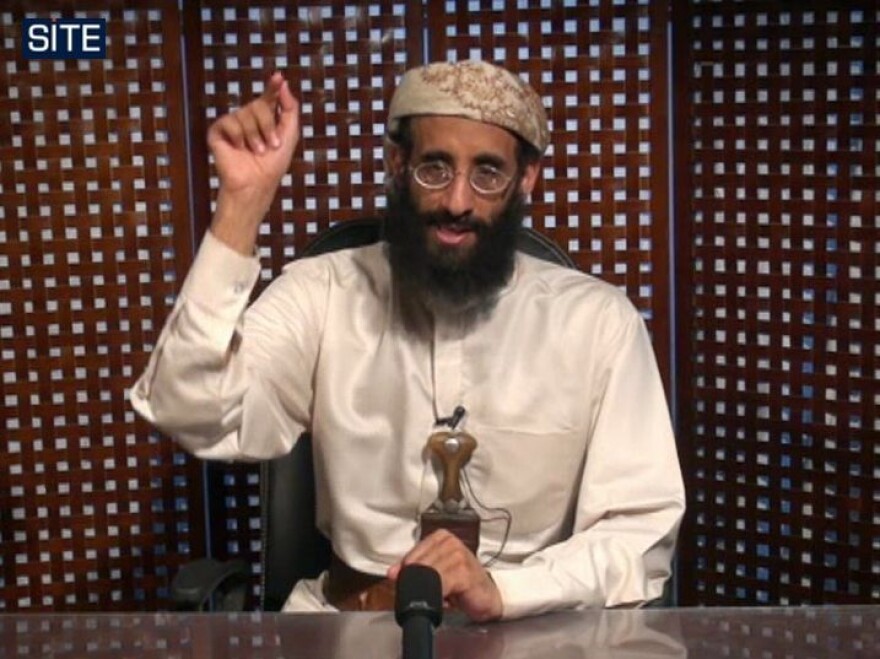It's one of the most serious actions the U.S. government could ever take: targeting one of its own citizens with lethal force.
Since last year, U.S. drones have killed three Americans overseas. But Attorney General Eric Holder says the ongoing fight against al-Qaida means those kinds of deadly strikes are now a way of life. And judging from the reaction to his national security speech at Northwestern University Law School on Monday, so is the hot debate over the legality of the U.S. drone program.
Since President Obama took office, he's deployed drones against terrorism suspects in an unprecedented way. But the program is covert, so although foreign governments and reporters have chronicled those strikes, no U.S. official is supposed to mention them directly. Instead, as Holder acknowledged, they use euphemisms like targeted killing or use of force.
"The president may use force abroad against a senior operational leader of a foreign terrorist organization with which the United States is at war — even if that individual happens to be a U.S. citizen," Holder said Monday.
Why The Critics Object
That bothers Jameel Jaffer of the American Civil Liberties Union.
"They are claiming the authority to kill any American citizen whom the president deems to be an enemy of the state," Jaffer says, "and that authority is not reviewable before the fact by any court and it's not reviewed after the fact by any court."
Jaffer is working with the family of Anwar al-Awlaki, a U.S. citizen born in New Mexico, who was killed by a drone in Yemen last September.

Prosecutors say Awlaki instructed Umar Farouk Abdulmutallab, the so-called underwear bomber, to blow up a plane flying over Detroit in 2009, and inspired several other homegrown terrorists. They say Awlaki, an influential cleric, became a leader in the group al-Qaida in the Arabian Peninsula. But they never publicly charged Awlaki with a crime, so he never had his day in court, raising questions about whether he got due process under the U.S. Constitution.
The Justice Department has refused to even acknowledge it prepared a memo authorizing the strike against Awlaki. Instead, after months of internal debate, the attorney general gave a speech setting out the broad legal rationale for targeting Americans overseas — never mentioning Awlaki by name.
When U.S. Acts
Holder said the government analysis starts with the question of geography: "Our legal authority is not limited to the battlefields in Afghanistan."
The Obama administration says al-Qaida has mostly moved out of Afghanistan and spread into Yemen and Somalia. Holder said the legal authorization Congress passed a week after the attacks of Sept. 11, 2001, stretches to cover military action there.
But that point is hotly challenged by Notre Dame Law professor Mary Ellen O'Connell.
"Killing persons far from armed conflict zones must follow law enforcement rules to comply with fundamental human rights," she says. "The president cannot assert that the U.S. is in a worldwide war or use the interstate right of self-defense to do an end run around law enforcement principles."
Holder said the administration acts after considering whether it has "the consent of the nation involved or after a determination that the nation is unable or unwilling to deal effectively with a threat to the United States."
In other words, the U.S. wants to know whether the foreign country has the law enforcement power, and the political will, to capture a suspected terrorist who's still alive.
Trusting The Administration
There's precedent for taking out an enemy leader. During World War II, the U.S. tracked the airplane flying the commander of the Japanese Navy — the man who presided over the attack on Pearl Harbor — and shot it down. But modern technology, in the form of drones, has introduced a new wrinkle, as Pentagon General Counsel Jeh Johnson pointed out in his own recent speech at Yale University.
"What is new is that with advances in technology, we are able to target military objectives with much more precision, to the point where we can identify, target and strike a single military objective from great distances," Johnson said.
Jaffer, of the ACLU, says the Obama administration is playing it both ways: giving speeches on the controversial targeted killing program, but claiming the program is a state secret when it gets sued.
Jaffer cites recent polls that say many Americans seem to accept Obama's "just trust us" approach. But, he asks, "Do you trust the next administration as well? Are you confident the next president will use this power in a way that you think is responsible?"
Matthew Waxman, who teaches law at Columbia University, says neither end of the political spectrum is likely to feel satisfied with the status quo.
"Even if the administration comes forward with further disclosures, many of the details about this operation are going to remain opaque," Waxman says.
They'll remain hidden from view, Waxman says, because that's the nature of the modern fight against terrorism, which clashes with Obama's promise of transparency.
Copyright 2023 NPR. To see more, visit https://www.npr.org.




